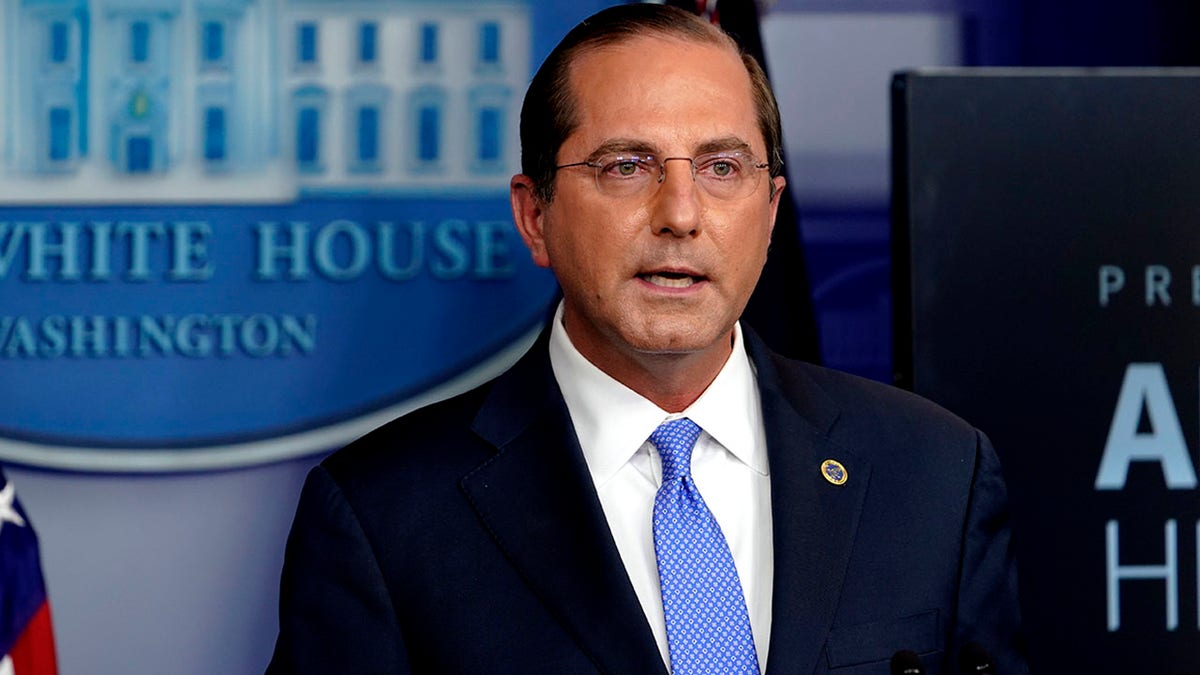Fox News Flash top headlines for January 14
Fox News Flash top headlines are here. Check out what's clicking on Foxnews.com.
Health and Human Services Secretary Alex Azar on Thursday heavily underscored mistrust in Chinese leadership, offering a nearly day-by-day account of federal steps taken to control coronavirus since the start of the pandemic as officials dealt with the noncooperative communist counterpart.
Azar said the genetic sequence for SARS-CoV-2 wasn't shared until Jan. 9, 10 days after the virus was reported in the media, and likely about two months after it emerged.
"Being able to investigate the virus in January would’ve helped the United States and the world develop a science and data-driven response," Azar said. "Instead we were flying blind, with human-to-human transmission of the virus not officially confirmed until Jan. 20."
WHO SCIENTISTS ARRIVE IN WUHAN TO INVESTIGATE CORONAVIRUS PANDEMIC ORIGINS
"We learned about an outbreak of pneumonia of unknown origin in Wuhan, China, on December 30, not through that country’s official channels, as required under the international health regulations, but through media monitoring that we do, as well as through a notification from Taiwan’s Economic and Cultural office here in the United States," Azar said during a virtual discussion with The Heritage Foundation. "One of the very first ways the U.S. government was notified of a novel virus in mainland China, was by people from Taiwan."
"Even as we were relaying what we knew to the American people, we suspected we could not trust the reports out of China," Azar continued. "Reports from China suggested the virus had likely emerged there by November, and the Chinese government’s explanation for the outbreak did not make sense."

Health and Human Services Secretary Alex Azar speaks during a news conference in the briefing room at the White House in Washington, Friday, Nov. 20, 2020. (AP Photo/Susan Walsh)
While Dr. Robert Redfield, head of the U.S. Centers for Disease Control and Prevention, was reportedly informed by the China CDC that the virus stemmed from animals in a Wuhan market, several clusters of cases cropped up among families in the first week of January. Azar said these clusters were unlikely to have occurred from close encounters with animals, instead suggesting human-to-human transmission.
GETTING CORONAVIRUS COULD PROTECT AGAINST REINFECTION FOR AT LEAST 5 MONTHS: STUDY
"There was so much we needed to know, and so little information coming out of China," the secretary continued. He detailed how China didn't acknowledge requests to send a team of CDC technical experts to help with an investigation until late January.
A team from the World Health Organization was also delayed in deployment until late February.
"Our teams were also pressing the Chinese government to send us viral isolates from patients there, and China has still, one year later, failed to provide the first generation viral isolates."
Azar said the U.S. was denied the opportunity to learn about COVID-19 from the country where it likely originated. He also defended the administration’s early praise for China, saying it was required to gain some cooperation, with U.S. officials allegedly pressing them in private. Azar slammed the WHO for continuing this praise for China, saying, "Unfortunately WHO never made the shift we did, continuing to lavish praise onto China even to this day."
However, months of diplomatic wrangling with Chinese officials drove the head of the United Nation’s health agency to voice a rare criticism of China, saying he was "very disappointed" the Chinese government hadn’t authorized the now-ongoing visit on Jan. 5. That probe will work to explore the origins of the virus, including a visit to Wuhan, where a team of 13 WHO officials are now under a two-week quarantine.
"In May, member states of the World Health Organization had to authorize by resolution an investigation specifically into the virus’ origins. Unbelievably, it was only this week that the investigators were allowed into China. Further, these investigators will largely examine the analyses already done by Chinese scientists," he said. "This flawed scope of investigation is the result of months of negotiations over last summer and into the fall, between WHO and China, with no input from the WHO executive board."
Azar suggested that if a novel virus emerged in a democratic nation, a global outbreak could have been avoided -- as opposed to an authoritarian government in China.

